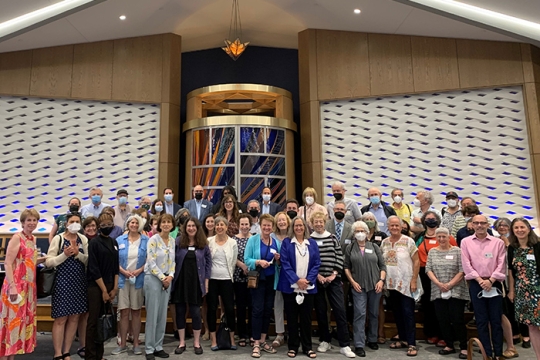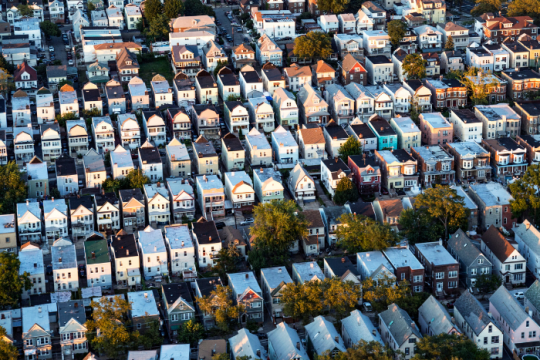
This post originally appeared on Anshe Chesed Fairmount Temple's blog and was adapted from a Friday evening Shabbat sermon.
Growing up in Manhattan, there were a lot of places my parents warned me to avoid, but the one area that loomed large in my mind was Times Square. No, not the Times Square of today. These were the days before Disney came to 42nd Street. It was dingy, dank and darkly mysterious. Triple X film titles were haphazardly spelled on the marquees on 7th Avenue. And dangerous-looking men and women were selling their wares to whomever passed by.
But when I reached high school I did venture down there with my friends every so often, and the sight that was most disturbing were the shadowy figures who turned out to be what we pejoratively called, “Druggies”. I will confess that in my immaturity and fear, I villainized them. I demonized them. I branded them as “other”. I created sordid origin stories about their lives so I didn’t have relate to them.
“They brought this on themselves”.
“They could have made better choices”.
Frankly put, I viewed that as a social plague, and Nancy Reagan’s call to “Just Say No” seemed spot on. Drugs were a scourge, a plague meant to be avoided – and its users should be dealt harshly by law enforcement.
This week’s Torah portion is also about enforcement towards people and things that were considered plagues on society.
Tazria-Metzora, a double-portion for this Shabbat, makes every indication that we must acknowledge the plagues in our communities and address them as social ills. As you may be well aware, this Torah portion is considered one of the most difficult to tackle in the Torah canon, but it is also one of the most important.
It conveys the urgency of removing someone who has a skin disease out of your community for fear of contagion. On the surface it might appear that the priestly enforcement of such disease is harsh towards the one infected, but if we look closer, perhaps Torah and the sages who comment on this after can shed some wisdom on how we confront the root ills in our society. After all, while those stricken with disease are jettisoned away for fear of contagion, they are ultimately welcomed back into the camp.
Interestingly, while our Torah portion famously address people with disease, it also teaches that even physical homes carry plagues:
כִּ֤י תָבֹ֙אוּ֙ אֶל־אֶ֣רֶץ כְּנַ֔עַן אֲשֶׁ֥ר אֲנִ֛י נֹתֵ֥ן לָכֶ֖ם לַאֲחֻזָּ֑ה וְנָתַתִּי֙ נֶ֣גַע צָרַ֔עַת בְּבֵ֖ית אֶ֥רֶץ אֲחֻזַּתְכֶֽם׃
When you enter the land of Canaan that I give you as a possession, and I inflict an eruptive plague upon a house in the land you possess,
וּבָא֙ אֲשֶׁר־ל֣וֹ הַבַּ֔יִת וְהִגִּ֥יד לַכֹּהֵ֖ן לֵאמֹ֑ר כְּנֶ֕גַע נִרְאָ֥ה לִ֖י בַּבָּֽיִת׃
the owner of the house shall come and tell the priest, saying, “Something like a plague has appeared upon my house.”
As a result, there were rituals that required the priests to investigate the plague, to determine if the house should be labeled as such, but many commentators actually don’t imagine that the plague was real at all. Those sages focus much more on the root cause of the plague rather than the plague itself. Commonly, commentators point to lashon hara, or damaging gossip, as the root cause of the skin disease and the plagues that ensue. That is, the plague is viewed as a product of behavior. And the focus is on learning from the cause and eradicating the disease through treatment, not by punishment.
There are other commentators that look deeper. Nehama Leibovitz, a 20th century Torah scholar, suggested that, “The Torah does not adopt a medical approach but regards the disease as a symptom of spiritual imbalance.” And in the Conservative movement’s Torah commentary, it says, “A home is a family’s private refuge. Thus a home afflicted by plague represents the breakdown of the social values that kept a family safe and united. It was a cause for concern if the problems of society-at-large had come to infect the home…" (Etz Hayim: Torah and Commentary, The Rabbinical Assembly, 2001, p. 664).
Perhaps, as the Torah points out above, appearance of the plague is a symbolic device to communicate needs still waiting to be addressed. The lasting memory of “those people” languishing on the streets of Times Square turned out to be a message that only made sense to me when I became fully aware of the extent of our community’s challenges with addiction. Today, this outsized crisis is threatening our communities and we must be awakened to its degree of severity.
There is a midrash that questions why Abraham was told to “go forth from your land”. Rabbi Yitchak replied that Abraham could be “compared to a man who was traveling from place to place when he saw a burning castle. (Abraham) said, “Is it possible that this castle lacks a person to look after it? The owner of the building looked out and said, “I am the owner of the castle.” …Abraham…said, “Is it possible that this castle has no master, no one to look after it?” the Holy Blessed One looked out and said to him, “I am the Master of the Universe.” …This passage suggests that when the world is on fire, it is seductive to outsource the work of doing the fixing to God or another. But when the palace is burning, we, like Abraham, must look no further than ourselves.
Friends, the proverbial house, our community, is not only stricken with a plague of drug and opioid abuse – it is on fire.
I use this pulpit tonight to continue to buttress what the Jewish community has begun to address – the acute opioid health crisis not only in our country, but specifically in our home state of Ohio. Thankfully, our Rabbi Nosanchuk is taking a leadership role in our community by serving on our region’s U.S. Attorney’s Opioid Task Force. And just weeks ago, Cleveland synagogues hosted speakers who have been touched by addiction.
It is widely viewed that drugs and alcohol addiction is not a Jewish problem. But that’s not the case at all. Just this week I met with longtime Clevelander and clergy colleague, Cantor Laurel Barr. As many of you may already know. Cantor Barr’s son, Yoni, has been a drug addict for over 10 years now – he started at 13. He ran with the wrong crowd, had a pre-disposition to drug use, and was withdrawn. As the years wore on, and Laurel and her husband tried year after year to get him into detox and recovery programs, Yoni continued to relapse and has been jailed for his continued drug use. If you know anything about opioids and drugs in general, they are highly addictive, hijacking the receptors in the brain and creating psychological and physical dependency – the same desires we use for food and intimacy. And, the hardest fact to face is that these drug dependencies are hijacking our children – because the frontal cortex is still developing in teenage brains. As a result, teens can become highly dependent on drugs, and it is an incredible challenge for them ever to recover. Laurel shared her story with me to advocate for her son, and for so many who suffer in silence.
There are so many “Yoni’s” in America today; men and women who have become dependent on drugs are going to prison, charged as felons. It is the common wisdom of clinicians that the last place recovering addicts should be is put in isolation in prison after breaking probation so they can score more drugs – they need to be in community and part of a recovery culture. But we, in America, continue to hold blame and shame above mercy and teshuvah.
One of the things that stuck with me after speaking with Cantor Barr is that for years she never told anyone in her community about her son’s addiction crisis. She – and her son – felt that shame. And this strikes me as completely valid.
Why wouldn’t she feel reticent to speak out and share Yoni’s story when few to no Jewish houses of worship host AA meetings?
Why shouldn’t Jews in similar situations feel unwanted by the Jewish community when the Al-Anon recovery meetings for family and friends of addicts take place in churches and not synagogues?
As Jews, it is our obligation to not stand idly by while our neighbors -- and yes, they are our neighbors -- find themselves alienated from the Jewish community, from the greater community.
That is why a new project of the Religious Action Center helped clergy in our state to create Reform Ohio. Reform Ohio looks to use the lessons of community organizing and create a network of congregations who can work for systemic change and tackle the plagues in our society. Reform Ohio connects Reform Jews from all over Ohio to walk together in common cause. Our first issue: tackling the plague of mass incarceration, and cutting off the addiction to prison pipeline.
Our longtime members, Bob and Lynn Jacobs, are collecting signatures to get an initiative on the ballot that is designed to increase public safety while decreasing incarceration. This ballot initiative, called the “Ohio Neighborhood Safety, Drug Treatment, and Rehabilitation Amendment”, would reduce criminal offenses from felonies to misdemeanors for those who use or possess drugs. For young adults like Yoni, such a plan could be transformative, offering more beds for recovery; not jail cells, where addicts only return after their release.
No one would ever imagine that a plague would be good news for anyone, but medieval commentator, Rashi, says just that. He wrote, “This is good news, when the plagues come! Because…gold treasures (are hidden) in the walls of their houses… And as a result of the plague, the owner breaks down the house and finds them!”
If our proverbial plague-ridden palace is burning, we must see ourselves as its owners. Once we break down those walls, and practice justice with unending mercy, then we will surely discover great treasures, our children, who are suffering under the brutal tyranny of fentanyl and other drugs that have hijacked their essence and spirit.
If we were all to take one positive step forward tonight, in addition to signing the petition, it is to stop demonizing the vulnerable in our midst as I did all those years ago on 42nd Street. Let us lead with mercy, and remember what we have forgotten – that each of us belongs to one another.
Related Posts

Four Lessons from the Launch of RAC-Massachusetts

RAC-IL Helps Secure Landmark Immigrant Justice Victory


